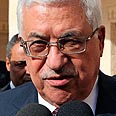
Israel cautiously optimistic ahead of Arab League summit
Sources in Jerusalem believe meeting in Libya to determine peace talks will not resume as long as settlement construction continues, but will leave window open for further contacts. Palestinian sources say Authority willing to accept Washington's compromise offer of two-month construction moratorium accompanied by intense negotiations
The Special Monitoring Committee of the Arab League will convene Friday in Libya, following the crisis in talks between Israel and the Palestinians. Israel said late Thursday there had been some progress in contacts with the US, and there is cautious optimism regarding the Arab League summit.
In the run-up to the summit, US Secretary of State Hillary Clinton spoke with Palestinian President Mahmoud Abbas, who demanded that Israel halt construction in the West Bank settlements to give the talks a chance to succeed.
Jerusalem believes the Arab League will decide that as long as Israel is building, there will be no talks. However, it will also leave a window open for further contacts, to enable a solution to the construction issue to be found.
Israel's ambassador to the US, Michael Oren, confirmed Thursday that the US had offered Israel a range of incentives to persuade Prime Minister Benjamin Netanyahu to agree to extend the settlement construction moratorium by two months. In return, Israel would receive a range of guarantees from the US.
Sources at the Prime Minister's Office declined to comment on the ambassador's claims. Figures involved in contacts between Israel and the US said that despite the pessimistic atmosphere, there had been some progress. On Thursday, senior government sources said the main point of contention between Israel and the US was the formulation of the statement of agreements, which is intended to facilitate continued talks between Israel and the Palestinians.
Netanyahu insists on a clear formulation, while the Americans prefer a more cautious formulation. In Israel, they say the disagreement is the reason why no unequivocal summary can be achieved.
'Palestinians wasted time'
The Arab League meetings are set to focus on Israel's decision not to extend the settlement freeze. Abbas is expected to update the Arab leaders on the recent developments and the US efforts to save the peace talks after the Palestine Liberation Organization's executive committee determined that negotiations would not resume as long as Israel builds in the West Bank.
Palestinian sources said the Authority is willing to accept Washington's compromise offer of a two-month construction moratorium accompanied by intense negotiations that will focus on the issue of borders.
Over the past few days the US and European Union have worked behind the scenes make certain the Arab League meeting won’t lead to a more rigid Palestinian stance.
Deputy State Department Spokesman Mark Toner said that what Washington considered "the best outcome is continued support in the region for direct negotiations."
"We want to see a positive signal come out tomorrow that talks about keeping negotiations on track. That is our goal, fundamentally," he said, adding that the US wanted "to see negotiations continue because it's only through direct negotiations that any of these issues are going to ultimately be resolved. So we're in direct negotiations now. We hope that they continue."
Italian Foreign Minister Franco Frattini met Minister Silvan Shalom in Rome and noted there were "feverish efforts" to keep the negotiations going. The Arab League needs to decide on Friday that more time must be given to finding a way to continuing the negotiations, he said.
Shalom responded by expressing his hope that Friday's decision would be positive, adding that the Palestinians "wasted the first nine months of Israel's settlement freeze."
Meanwhile, sources in Jerusalem said the US is trying to renew negotiations between Israel and Syria, also due to fears of what may transpire in Iraq following the American withdrawal.
Yitzhak Benhorin contributed to the report
- Follow Ynetnews on Facebook










